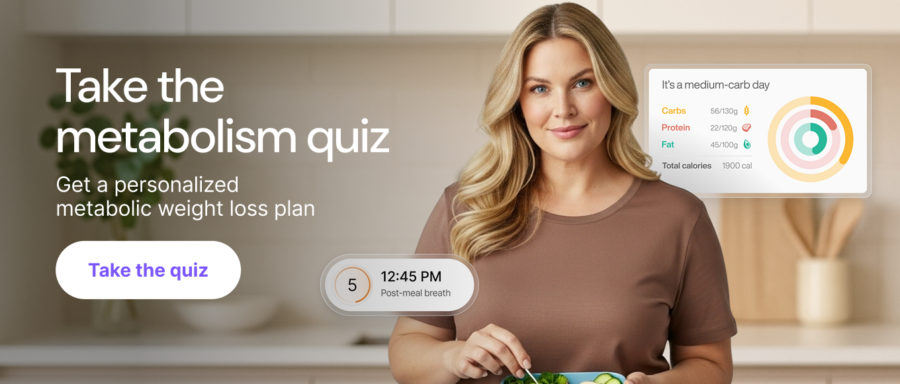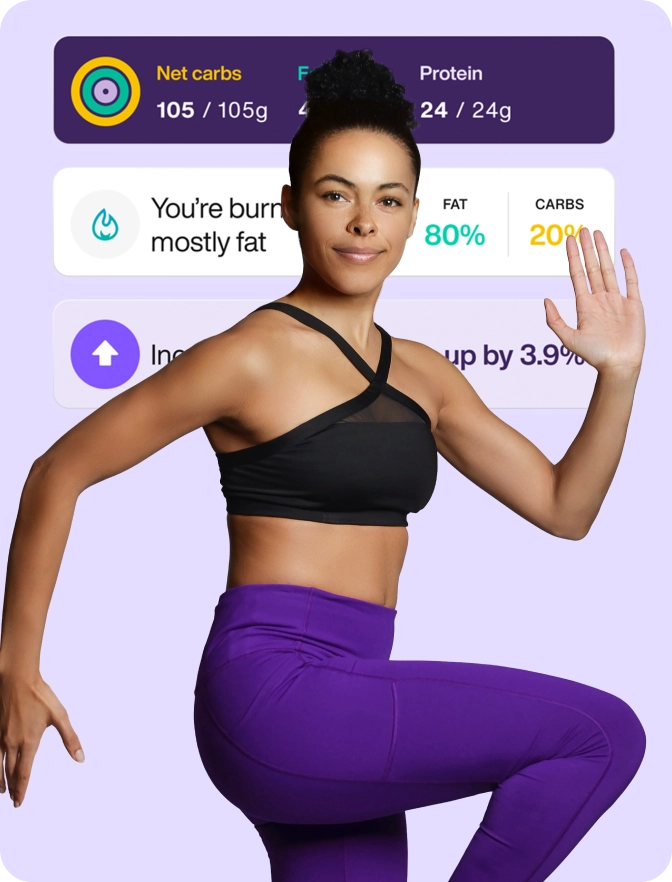Carb cycling for weight loss: A beginner’s guide

Carbs are your friends, not foes, even during weight loss
While we know that consuming too many refined carbs, such as white bread, pasta, and sugary snacks, may contribute to weight gain and other health problems, most of us eat these foods regularly. In fact, according to one study1, low-quality carbs still account for 42% of daily calories, while high-quality carbs — such as whole grains and fruits — only account for 9%.
This is one of the many reasons carbs can be a controversial topic and why many diets eliminate them to help with weight management. Yet, cutting out carbs completely isn’t a solution because they’re necessary for sustainable weight loss.
You can still eat carbs and lose weight. It’s about balancing the quality, quantity, and timing of your carbohydrates and understanding how they impact your metabolism.
If you have a love-hate relationship with carbs, often enjoying them but feeling guilty or second-guessing yourself after eating them, you may be curious about the benefits of carb cycling. Let’s find out more.
What does carb cycling mean?
Carb cycling is an eating pattern that alternates between high-carb and low-carb days. It’s not a diet but rather a way of eating that helps your mitochondria, the powerhouses of your cells, to easily shift between carb and fat burn.
High-carb days give your mitochondria the energy they need to power your workouts and replenish glycogen, the stored form of glucose in muscles and the liver. On low-carb days, your mitochondria rely on fat for fuel.
When your mitochondria are more resilient, moving between carb and fat burn, they become metabolically flexible. This has many benefits, including weight loss, better body composition, improved athletic performance, and balanced energy.

How does your body respond to carb cycling?
Increased insulin sensitivity
Carb cycling can influence insulin sensitivity, which is crucial for metabolic health and weight management. Insulin sensitivity refers to how effectively the body’s cells respond to the hormone insulin, which regulates blood glucose levels.
High insulin sensitivity means cells use blood glucose more efficiently, reducing the risk of conditions like type 2 diabetes. On high-carb days, increased insulin levels facilitate glucose uptake into muscle cells, promoting glycogen storage and muscle repair2.
On low-carb days, reduced carbohydrate intake and lower insulin levels help the body rely more on fat for energy and may improve insulin sensitivity. This alternating pattern helps maintain balanced blood sugar levels, reduces insulin resistance, and supports overall metabolic health.
Balanced glycogen
Carb cycling can also optimize glycogen levels to enhance performance and recovery. Glycogen plays a critical role in providing energy during physical activities.
On high-carb days, increased carbohydrate intake replenishes glycogen stores, ensuring muscles have ample energy for intense workouts and reducing muscle fatigue. During low-carb days, glycogen stores become depleted, prompting the body to use fat as an alternative energy source3.
This cycle of glycogen replenishment and depletion boosts metabolic flexibility and promotes fat oxidation, which promotes weight loss.

How to structure your carb cycling schedule
You can structure your carb cycling in several ways. The most common method is alternating between low- and high-carb days, but you can also alternate between high- and low-carb weeks.
The amount of calories you eat daily or weekly depends on your goal. If you’re trying to lose weight, your daily intake should be at a caloric deficit4. If your goal is muscle growth, you will want to eat a surplus of macros daily, but make sure to balance your carbs and allow them to fit into your low- and high-carb days. Those who just want to balance their body composition or maintain their weight may find themselves somewhere in between.
Use a macro tracker to determine how many grams of carbohydrates you should eat based on your body weight. It may take some trial and error, but having a personalized nutrition plan based on your real-time metabolic biofeedback will remove the guesswork of understanding what your body needs to achieve your goals.

״A macro-based diet allows each of us to harness the power and potential of our metabolism in the journey to our health goals. Cycling through low -and high-carb intake promotes better metabolic flexibility, allowing our body to easily shift between carb and fat use for energy.”
Dr. Michal Mor PhD
Co-Founder & VP of Product
Here are some carb cycling tips from our Lumen experts:
- On high-carb days, eat complex carbs like brown rice and quinoa and pair them with healthy fats and protein to prevent blood sugar spikes.
- Consume your carbs earlier in the day and have a lighter dinner. This will help you digest your food better and have quality sleep.
- You're more insulin sensitive post-workout, so aim to time your carb intake around workouts like weightlifting to optimize carb uptake.
- Be patient with yourself. Stick to a consistent carb cycling routine for a couple of weeks before making changes to see what macros work for your body.
Carb cycling recipes to try
Low-carb day recipes
Greek chicken salad
Ingredients
- Chicken breasts, sliced into chunks or strips
- Feta cheese, crumbled (or any other type of cheese you like)
- Red onion, diced
- Grape tomatoes, halved
- Kalamata olives (optional)
Chop, dice, and mix all the ingredients and enjoy!
Garlic salmon and broccoli
Ingredients
- Salmon
- Garlic
- Olive oil
- Broccoli
- Salt, pepper
You can either air fry, bake, or cook the broccoli on the stove with a drizzle of olive oil. Chop the garlic, add it to a pan, and saute. Spread a generous amount of salt and pepper on the salmon and add to the pan with the garlic. Cook for 4 minutes on each side!

High-carb day recipes
Chicken enchilada bowls
- 1 cup black beans (rinsed and drained)
- 2 cups cooked chicken breast, shredded or cubed (we used rotisserie chicken)
- 1 cup enchilada sauce (store-bought)
- Toppings: sour cream or Greek yogurt, sliced avocado, chopped cilantro leaves, and lime wedges for squeezing on top
Chicken enchilada bowls
- Tofu or chicken
- Brown or jasmine rice
- Bell pepper
- Green onion
- Teriyaki sauce
Saute the veggies and tofu or chicken. Cook the rice (about 1 cup). Once the veggies and meat are cooked, add them to one pan and drizzle teriyaki sauce on top. Mix in one bowl with the rice.
Find the carb cycling schedule that’s right for you
Carb cycling is one of the most effective ways to boost metabolic flexibility, burn fat, and lose weight. Having a personalized nutrition plan based on your real-time metabolic measurements will help you determine when your body needs a low- or high-carb day so you can stay on track with your health and weight loss goals.







 Digital download
Digital download 


